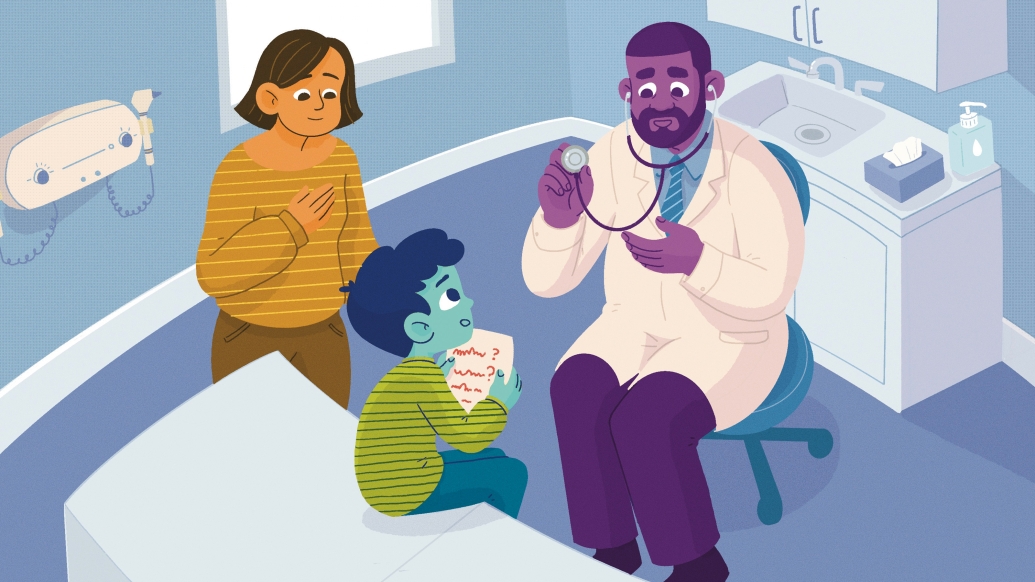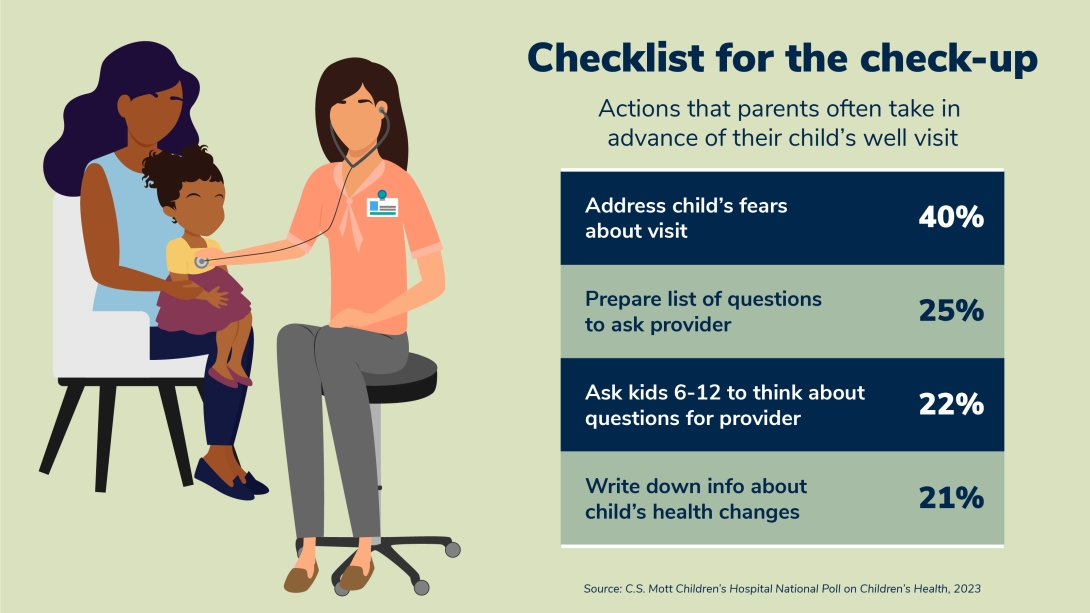While many parents keep recommended well visits with their child’s primary provider, some may consider more proactive steps to make checkups as productive as possible
5:00 AM
Author |

While most parents and caregivers stay on top of scheduling regular checkups for their kids, they may not always be making the most of them, a national poll suggests.
Most parents report their child has had a well visit in the past two years and two thirds say they always see the same provider, according to the C.S. Mott Children’s Hospital National Poll on Children’s Health at University of Michigan Health. However, fewer parents took all recommended steps to prepare themselves and their kids ahead of time.
“Regular well visits mean guaranteed face time with your child’s doctor and an opportunity to not only discuss specific concerns and questions about your child’s health but get their advice on general health topics like nutrition, sleep and behavior,” said Mott Poll co-director Sarah Clark, M.P.H. “We were pleased to see that the majority of parents regularly make these appointments and maintain relationships with a trusted provider. But they may not always be taking a proactive approach to ensuring they address all relevant health concerns impacting their child’s physical, emotional and behavioral health at every visit.”
In advance of well visits, a fourth of parents say they often prepare a list of questions to ask the provider, while a little over half said they sometimes wrote things down and about a fifth said they never do.
Meanwhile, about a fifth of parents say they often write down information about their child’s health changes while half say they sometimes take this step and three in 10 don’t do this at all.
“Well visits are busy, and in the moment, it’s easy for parents to forget to bring up questions or concerns with a doctor,” Clark said. “Writing them down ahead of time will help prioritize topics and help you get the most out of the appointment.”
Less than 15% of parents say they often research information online to discuss with the provider, while about half sometimes do and 38% never do.
“We are constantly learning new information that may impact children’s health and some recommendations may evolve or be updated,” Clark said. “Many pediatricians and care providers will bring these topics up themselves but not always. It’s always helpful for parents to do some homework ahead of time to make sure they’re aware of any timely topics affecting their child’s age group.”
Preparing children for the visit
Two in five parents say they often take steps to prepare their child for an upcoming well visit by addressing any fears they may have while slightly more than that sometimes do this while a little less than one in five never do this. A fourth of parents often also offer rewards for cooperating while less than half sometimes use such incentives.
For parents of children aged 6-12, a little more than one in five also regularly ask the child to think about questions for the provider.
“As kids approach puberty, their bodies begin changing. A well visit is a great opportunity to have the provider explain why these changes happen,” Clark said. “Having kids think about health topics themselves is also good practice for when they get older and parents become less involved with health visits. Preparing for this transition early will benefit them when they need to take more ownership of their health.”
Regular well visits mean guaranteed face time with your child’s doctor and an opportunity to not only discuss specific concerns and questions about your child’s health but get their advice on general health topics like nutrition, sleep and behavior.
Most parents also recall completing questionnaires and checklists about their child at well visits. Among these parents, the majority say they understand the purpose but just about three fourths say they receive feedback about how their child is doing.
“Children and their families are more often getting questionnaires at visits to help identify issues like sleep problems, challenges impacting emotional health and behavioral health concerns,” Clark said. “But when time is short, this may not come up during the actual visit. It’s important parents have conversations with providers about any issues that may surface from the child’s or family’s responses.”
Seeing providers familiar with your child’s history

Nearly half of parents say they schedule well visits with their child’s regular provider even if they have a long wait for an appointment. A third of parents also strongly agree their child is more likely to follow advice if it comes from a provider their child knows well.
For their child’s most recent well visit, more than half of parents also rate the provider as excellent for knowing the child’s health history, answering all their questions and giving recommendations that are realistic for the family.
A primary care physician familiar with a child and their specific health history will help them stay healthy, prevent disease and illness by identifying risk factors and taking the right steps to manage chronic disease care, Clark says.
“We know that continuity with the same provider has long term health benefits for children. Parents polled whose child always sees the same provider for well visits are also more likely to rate the provider as excellent,” Clark said. “Nurturing a relationship with a primary care provider means that the health professional who knows your child best is the one providing individualized care and helping your family navigate important decisions impacting their health.”
However, when well visits are scheduled with a different provider, either by choice or necessity, “parents may benefit from different explanations or perspectives on their child’s health,” Clark added.
The nationally representative report is based on responses from 1,331 parents with children aged 1 to 12 years who were polled in August-September 2022.
Five ways to ensure the most productive well child visit, according to Mott experts:
-
Build a long-lasting trusted relationship with the same primary care provider who your child always sees for appointments, which may include a pediatrician, other family physician or nurse practitioner.
-
Write down questions regarding your child’s physical, emotional and behavioral health in the same place as they come up to review again when a child is due for a well visit.
-
Share input from teachers or daycare providers about the child's behavior or school performance and ask the primary care provider for the need for further assessment or therapy.
-
Prepare children for the visit. If there’s a physical exam, talk them through what to expect. For young children who need immunizations or blood draws, prepare them with books ahead of time, consider comfort positions and distractions like cartoons on screens during shots or give them something fun to look forward to after the visit like ice cream. Never promise them they won’t get a shot. More tips here.
-
For older children, help them come up with a list of questions to ask the doctor themselves.

Explore a variety of healthcare news & stories by visiting the Health Lab home page for more articles.

Department of Communication at Michigan Medicine
Want top health & research news weekly? Sign up for Health Lab’s newsletters today!





